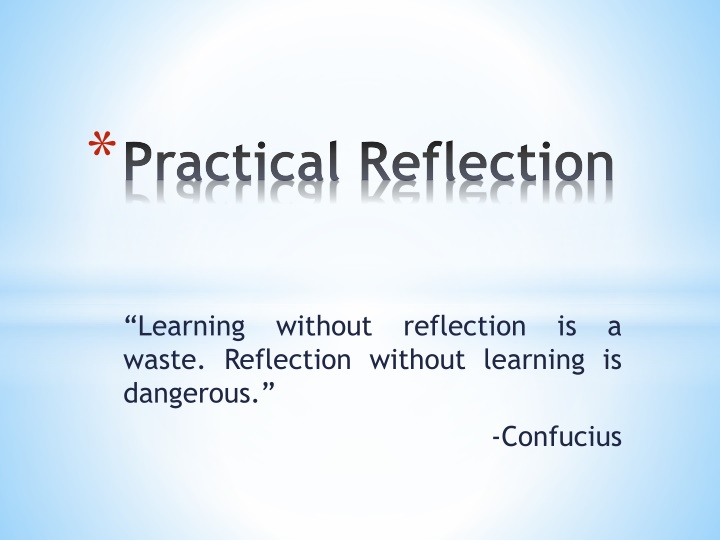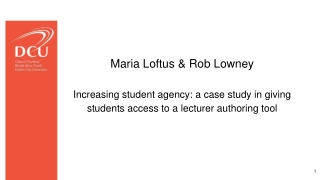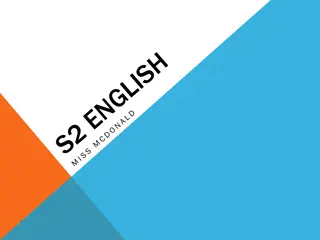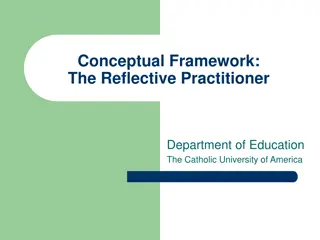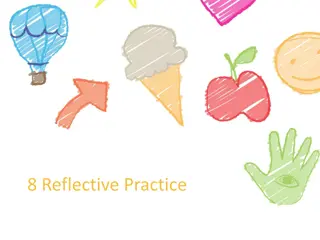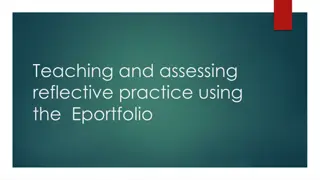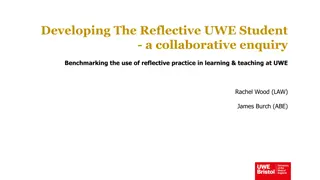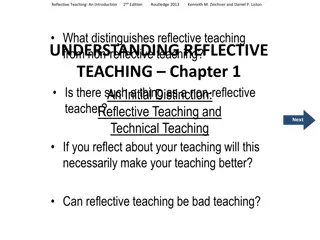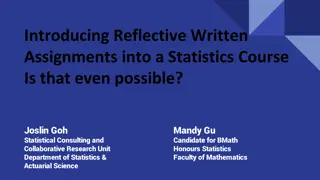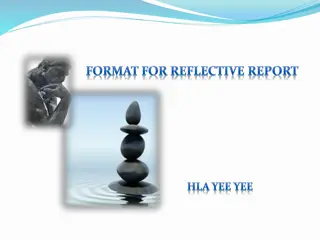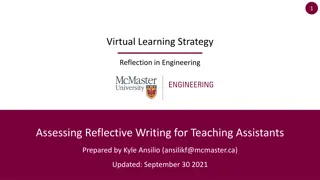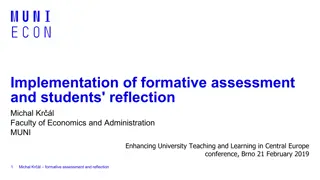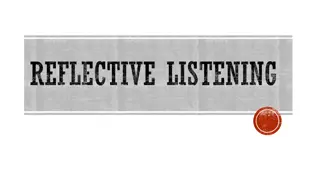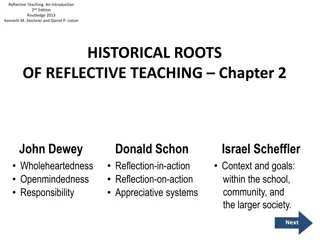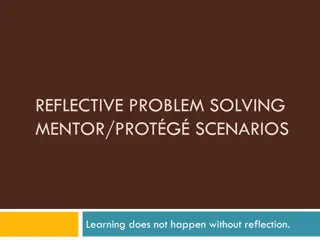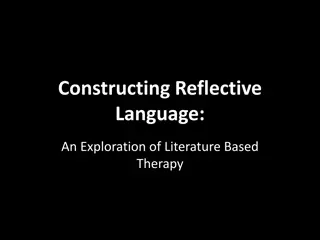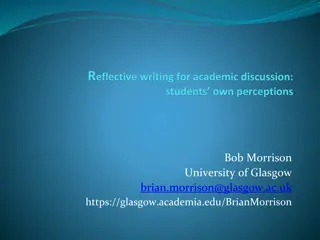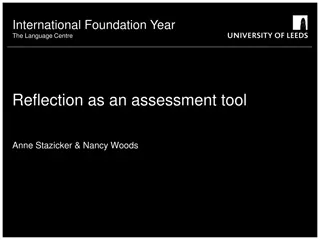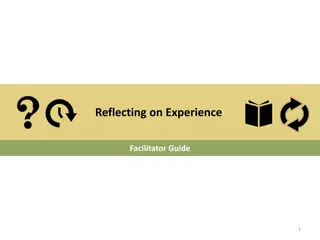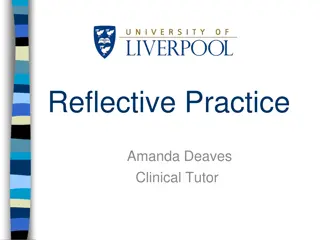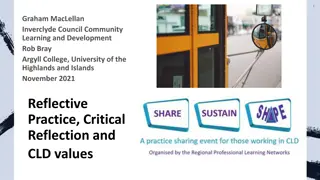Enhancing Learning Through Reflective Practices: A Comprehensive Guide
Explore the significance of reflection in professional development, understanding various reflective practices, and engaging in activities to foster individual and group reflection. Discover the dynamics of cyclical learning, the cognitive and affective aspects of reflection, frameworks for improvement, and the Gibbs Model for structured reflection. Gain insights into scientific support for reflective processes and the qualities of an expert reflector.
Download Presentation

Please find below an Image/Link to download the presentation.
The content on the website is provided AS IS for your information and personal use only. It may not be sold, licensed, or shared on other websites without obtaining consent from the author.If you encounter any issues during the download, it is possible that the publisher has removed the file from their server.
You are allowed to download the files provided on this website for personal or commercial use, subject to the condition that they are used lawfully. All files are the property of their respective owners.
The content on the website is provided AS IS for your information and personal use only. It may not be sold, licensed, or shared on other websites without obtaining consent from the author.
E N D
Presentation Transcript
*Practical Reflection Learning waste. Reflection without learning is dangerous. without reflection is a -Confucius
*Objectives *Recognize the value of reflection for learning and professional development *Describe differences in reflective practices between the novice and expert professional *Participate in reflective activities individually and in small groups
*Definition1 *Reflection = an internal process of examining an experience that raises an issue of concern and can help us refine our understanding of an experience, which may lead to changes in our perspectives Image from: www.penelopeironstone.com
*Dynamic and Cyclical Learning2,3 Hypothesis Generation: Reflection for Action Post- Activity: Reflection on Action Active Learning: Reflection in Action
*More than Meets the Eye *Reflection involves both cognitive and affective behaviors1 *The reflective process encourages examination of our own attitudes, beliefs and goals and how they influence the situation1 *Reflection is integral for professional growth1 *Frameworks exist to help us become better reflectors4
*Gibbs Model of Reflection5 Description (what happened) Feelings Action Plan (what were you thinking/ feeling?) (if it arose again what would you do?) Evaluation Conclusion (what was good/bad about the experience?) (what else could you have done?) Analysis (what sense can you make of the situation?)
*Scientific Support *New neuronal connections are made when linking new knowledge to prior learning or past experiences1 *A change is also observed in the frequency and type of reflection utilized between the novice and expert professional Image from: http://www.brain- connect.eu
*Qualities of an Expert Reflector1 *Reflection is more than just stopping to think and act based on what we already know, it requires us to consider all of the factors that may be influencing a given situation and to explore the multiple possibilities available for solving dilemmas *Skillful reflectors are critical thinkers, and critical thinking is the basis for effective clinical decision making and high quality care
*Tools for Reflection2 *Journal writing for self-produced feedback *Videotaping of professional activities to provide objective and re-playable documentation *Peer observation and feedback *One-on-one interviews with person s interacting with *Mentoring/Coaching
*Outcomes with Reflection6 *Enhanced self-knowledge + *Enhanced content knowledge + *Enhanced procedural knowledge = *Enhanced outcomes and elevated professional reputation
*Activities *Take the next 5 minutes to complete a written reflection on this summer experience using Gibbs Model of Reflection *In small groups take turns answering at least one question from each subheading: *Backward-Looking *Inward-Looking *Outward-Looking *Forward-Looking
*References 1. Plack M, Driscoll M. Teaching and Learning in Physical Therapy: From Classroom to Clinic. Thorofare, NJ: Slack Inc; 2011. Hayward LM. Becoming a self-reflective teacher: a meaningful research process. Journal of Physical Therapy Education. 2000; 14(1): 21-30. 2. 3. Plack MM, Santasier A. Reflection practice: A model for facilitating critical thinking skills within an integrative case study classroom experience. Journal of Physical Therapy Education. 2004; 18(1): 4-12. 4. Atkinson HL, Nixon-Cave K. A tool for clinical reasoning and reflection using the international classification of functioning, disability and health (ICF) framework and patient management model. Phys Ther. 2011; 91: 416-430. doi: 10.2522/ptj.20090226 5. Gibbs Model of Reflection. Queen Margaret University. Available at: http://www.qmu.ac.uk/els/docs/Reflection.PDF. Accessed August 5, 2016. 6. King G. A framework of personal and environmental learning-based strategies to foster therapist expertise. Learning in Health and Social Care. 2009; 8(3): 185-199. doi: 10.1111/j.1473-6861.2008.000310.x
